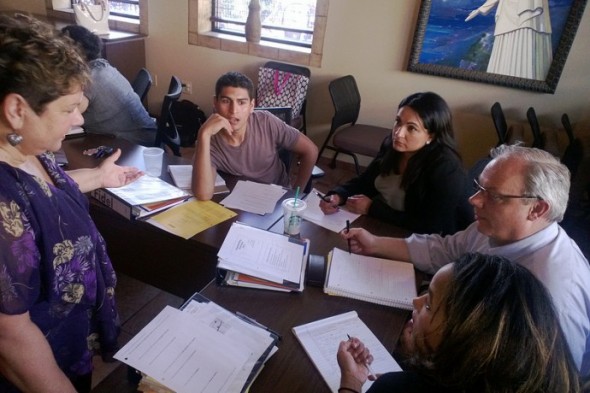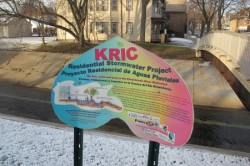UWM Program Nurtures Latino Leaders
Many graduates of 9-month program now serve on non-profit boards.

Latino Nonprofit Leadership Program participants work together to solve programs during a class. (Photo courtesy of the Latino Nonprofit Leadership Program)
Two years ago, Iris Gonzalez had a life-changing experience that has flowed down to benefit the members of the Latino community who live along the Kinnickinnic River.
The 29-year-old participated in the Latino Nonprofit Leadership Program, which gave her the confidence to galvanize residents to address challenges resulting from a project to widen the river’s base and demolish more than 80 homes in their neighborhood. Gonzalez helped create a neighborhood organization focused on these issues.
“My role is to work with the neighborhood to help them understand the large-scale transformation that is going to happen and to have them be able to influence that project,” she said.
Gonzalez is one of 138 participants who have graduated from the nine-month Latino Nonprofit Leadership Program at the University of Wisconsin-Milwaukee’s Roberto Hernández Center. The program was created in 2005 to meet the demand for leadership in local nonprofit organizations that focus their attention on the Latino community.
“The intention is to establish a sense of philanthropy within our community,” said Enrique Figueroa, director of the program.
After a retreat during the first or second weekend in February, participants meet for four hours each Wednesday for 28 weeks. The weekly meetings consist of presentations and discussions led by experts in leadership, management and other aspects of nonprofit organizations.

Changes resulting from a flood control project on the Kinnickinnic River prompted Iris Gonzalez to create a new neighborhood organization. (Photo by Edgar Mendez)
Participants are required to complete personal vision and mission statements and a final project. They also are paired with a mentor, who is a professional in the community.
The curriculum consists of four components: the leader within, the organization leader, the nonprofit manager and the community leader.
After completing the program, participants are able to answer “who am I, how am I and why am I,” Figueroa said. “We feel it’s very important for people to have an understanding of the answers of those three questions. It empowers them.”
Participants “are getting a sense of who they are and they are getting the sense of their ability to interact in the community,” Figueroa added.
A 2008 graduate, Jennifer Flamboe, 35, said she entered the program because she was interested in the local nonprofit community and had a strong connection to the Latino community.
“My experience in the program was unbelievable,” said Flamboe, an assistant professor of Spanish and healthcare interpretation at Alverno College. “You do a lot of soul searching. So you start learning about yourself and where you want to be as a leader… and how you want to help the community.”
Flamboe said one of the benefits is the networking that has occurred with program alumni.
“Everyone is very cordial, open and willing to help each other — kind of a fraternity, so to speak,” she said.
The program, which costs $400, does not require participants to be Latino, but they must be bilingual and have a history working or volunteering for a nonprofit organization.
Having a keen sense of one’s leadership abilities “is so important for building trust, which is unique to people of color. They want to see what you are made of and that you are for them and with them and not leading them along,” Gonzalez said.
One of the program’s strong suits is that the individuals who participate are diverse in age, education and experience. Figueroa said that diversity is challenging, but at the same time, “it’s a very powerful force.”
Many graduates are serving on nonprofit boards and leading organizations, according to Figueroa, who noted that about a fourth of graduates have gone on to get bachelor’s and master’s degrees.
“True benefits of the program are not going to manifest themselves until five years after they graduate,” he said.
This story was originally published by Milwaukee Neighborhood News Service, where you can find other stories reporting on fifteen city neighborhoods in Milwaukee.





















